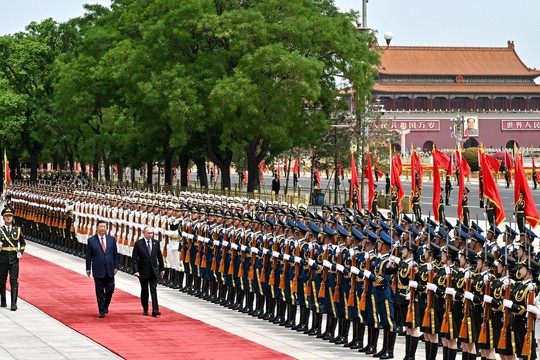Chinese President Xi Jinping received Russian President Vladimir Putin.
Photo: Kremlin.ru
The state visit by Russian President Vladimir Putin to China underscored that the two superpowers’ choice of entente-type alignment has gained traction. It falls short of explicit military obligations of support and yet will not entirely rule out military support either.
It provides them the optimal means to address the common threat they face from the United States via the prism of collective action while preserving the autonomy for independent action to pursue specific interests, writes M.K. Bhadrakumar, Indian Ambassador and prominent international observer.
The epochal significance of the talks in Beijing lies in that the bedrock of strategic understanding accruing steadily to the modelling effort of the Russia-China entente has evolved into a more effective alignment choice than a formal alliance to balance against the US’ dual containment strategy.
In his media statement following the talks, Xi Jinping made clear the guiding principle. He said, “The idea of friendship has become deeply ingrained in our mindsets… We also demonstrate mutual and resolute support on matters dealing with the core interests of both parties and address each other’s current concerns. This is the main pillar of the Russia-China comprehensive partnership and strategic cooperation for a new era.”
The mutual trust and confidence is such that the current Russian offensive in Kharkov began on May 10 just six days before Putin’s trip to China.
Notably, the joint statement issued after Putin’s visit affirms that for “a sustainable settlement of the Ukrainian crisis, it is necessary to eliminate its root causes.” Going beyond the vexed issue of NATO expansion, the 7000-word document for the first time attacked the demolition of monuments to the Red Army in Ukraine and across Europe and the rehabilitation of fascism.
Beijing senses that Russia has gained the upper hand in the war. Indeed, if the NATO were to suffer defeat in Ukraine, it would have profound consequences for the transatlantic system and the US’ inclination to risk yet another confrontation in the Asia-Pacific.
China is mindful of the fault lines in the Euro-Atlantic alliance and is purposively developing close relationship with parts of continental Europe. This was the leitmotif of Xi’s recent tour of France, Serbia and Hungary, as evident from the nervous reaction in Washington and London.
China has no illusions that its confrontation with the US is strategic in nature and at its core lies Washington’s aim to control access to the world’s resources and markets and impose the global standards in the fourth industrial revolution.
European elites are not considering any new policy yet but this is likely to change after the elections to the European Parliament (June 6-8) as they are pushed to find a compromise with Russia stemming out of the rising economic costs associated with defence spending, deepening concern about the prospect of a direct conflict with Russia amidst the growing realisation that Russia cannot be defeated, and an awakening of public opinion that European spending on Ukraine in effect is financing the US military-industrial complex.
China expects all this to have a salutary effect on international security in a near term. The bottom line is that China has high stakes in a harmonious relationship with Europe, which is a crucial economic partner, second only to ASEAN.
Simply put, Beijing is counting that the deepening of its economic ties with the EU is the surest way to encourage the leading European powers to rein in the US’ adventurist, unilateral interventionist strategies in world politics.
Time is on Russia and China’s side. The gravitas in their alliance is already infectious, as far-flung countries in the global south flock to them. A strong Russian presence along west Africa’s Atlantic coast is now only a matter of time. The intensifying foreign policy coordination between Moscow and Beijing means that they are moving in tandem while also pursuing independent foreign policies and allowing space for them to leverage specific interests.
Xi stated in his media statement that China and Russia are committed to strategic coordination as an underpinning of relations, and steer global governance in the right direction. On this part, Putin highlighted that the two big powers have maintained close coordination on the international stage and are jointly committed to promoting the establishment of a more democratic multipolar world order.
The symbolic component of Putin’s visit to China, being his first trip after the inauguration, is of great importance. The Chinese read all these signs perfectly and fully appreciate that Putin is sending a message to the world about his priorities and the strength of his personal ties with Xi.
The joint statement, which signifies a deepening of the strategic relationship, mentions plans to step up military ties and how defence sector cooperation between the two nations has improved regional and global security.
Most important, it singled out the United States for criticism. The joint statement says, “The United States still thinks in terms of the Cold War and is guided by the logic of bloc confrontation, putting the security of ‘narrow groups’ above regional security and stability, which creates a security threat for all countries in the region. The US must abandon this behaviour.”
read more in our Telegram-channel https://t.me/The_International_Affairs

 13:44 21.05.2024 •
13:44 21.05.2024 •























